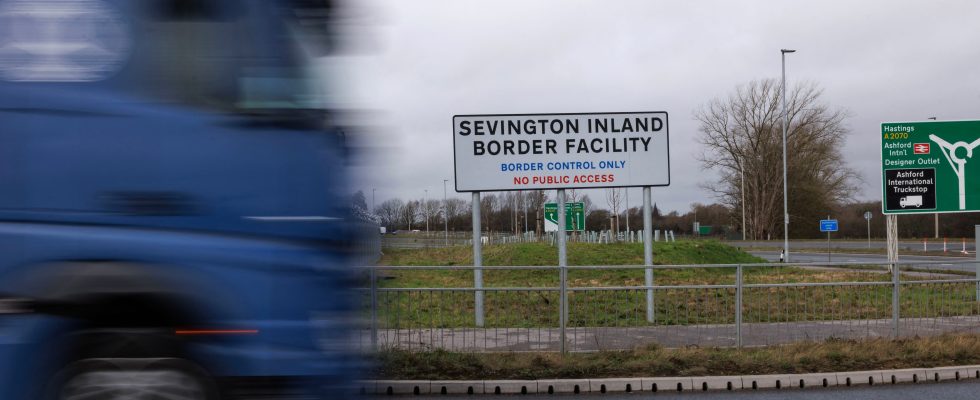Nearly eight years after the referendum on the United Kingdom’s withdrawal from the European Union (EU) and more than three years after the effective exit of the British from the single European market, a new stage is beginning in the implementation of the Brexit. New physical controls on products must therefore be put in place at the border this Tuesday, April 30. The cost of the measure and its implementation – still unclear a few days before the deadline – are of particular concern to British employers’ organizations.
At the end of January, sanitary and phytosanitary certificates became compulsory for certain products of “risky” animal or plant origin, which required a certificate produced by a veterinarian. Since April 30, all animal and plant products coming from the EU have been subject to physical controls. Namely cheeses, butters, creams, sausages, hams or cold meats, but also certain cut flowers, roots or tubers.
The entry into force of these new controls puts an end to many years of imbalance between London and the Member States of the Union. From January 1, 2021, the date on which the United Kingdom left the single market, British imports into the EU have been subject to various controls – London being therefore considered “like any other third country”, as the European Commission website.
Customs declarations, registration of value added tax, certificates for the agri-food industry and certain chemical substances… British companies have had to comply with all of these rules, with the exception of goods coming from or destined for ‘North Ireland. European exporters therefore found themselves at an advantage compared to their British competitors.
“The UK administration was not ready”
On five occasions since 2021, the British authorities have tried to compensate for this imbalance with EU companies by putting these controls in place. In vain. “The United Kingdom administration was not ready,” confides Aurélien Antoine, professor of public law at the Jean Monnet University of Saint-Etienne and founder of the Brexit Observatory, to L’Express.
And to continue: “Exiting an integrated market of more than 50 years is extremely complicated, especially since the result of the 2016 referendum was not anticipated and successive governments, notably that of Boris Johnson, handled Brexit in a political manner, without consulting the administration.”
The United Kingdom, which imports nearly 30% of its food from the EU, according to the latest report on UK food security dating from 2021, feared an additional shock during the Covid-19 period, which was followed by galloping inflation. Between January 2022 and January 2023, prices increased by 10.1% in the country, according to INSEE.
“Progressive” implementation of controls
Problem: by playing for time, delays accumulate. And fears regarding the implementation of these controls are increasing. “The government has still not said what will happen to goods entering the UK that do not have the necessary documentation. Will they be blocked at entry? [du territoire] or will they be processed afterwards? This risks leading to blocked deliveries if it is not well managed,” worries William Bain, head of trade policy at the British Chamber of Commerce, to the World.
“The parliamentary committee responsible for the Brexit file in the House of Commons criticized the government last week on this vagueness which persists around the nature of the controls as well as their duration,” confirms Aurélien Antoine. For good reason, a few days before the implementation of said physical controls, the British executive has – already – reversed course. In order to avoid “major disruptions” at ports, the government will waive certain checks announced on food products coming from the EU, as reported by Financial TimesApril 18.
The Department of the Environment and Agriculture fears that endless queues will form at British ports due to certain difficulties in registering products. “The implementation of controls will thus be gradual, observes Aurélien Antoine. They will initially intervene on the most sensitive foodstuffs, in significant quantities.”
For their part, British companies deplore the lack of communication. Asked by The GuardianMartin McTague, president of the Federation of Small Businesses, notes that the system is “completely disorganized” and that companies are having to “decode messy and unclear messages”.
Rising food prices, inflation…
For the government, is this yet another step backwards or a proof of pragmatism? “We know that these controls will increase the cost of the foodstuffs concerned,” replies Aurélien Antoine, for whom this delay was inevitable given the “lack of precision and anticipation of the administration”, but also the economic situation.
The government acknowledged in January that these changes could result in additional costs of 330 million pounds (386 million euros) per year on imports from the EU. However, he assured that this would not have a significant impact on food inflation.
But according to one study by the insurer Allianz Trade, published this month, these new costs will number more in the billions. Border controls “should increase the price of agricultural products imported from the EU by 2 billion pounds” (around 2.36 billion euros) per year, estimates the insurer. “Dairy products, meat and fish” will be the most affected products.
As a result, inflation will be inflated by “0.2 percentage points”. Price increases have slowed significantly in the United Kingdom: in March, inflation stood at 3.2% year-on-year, according to figures from the General Directorate of the Treasury. However, it remains the highest of the G7 member countries.
